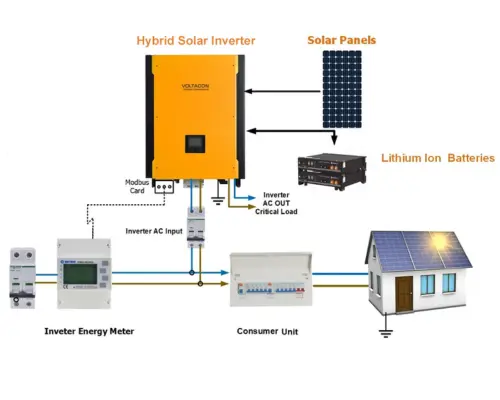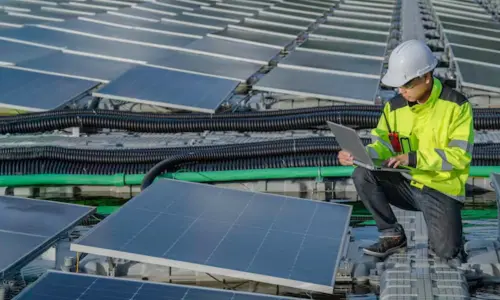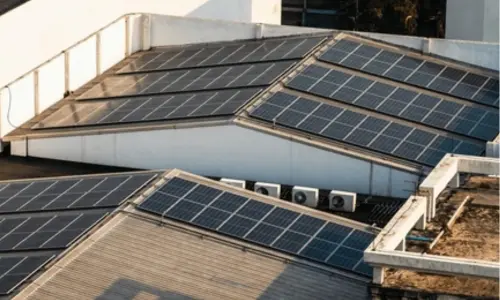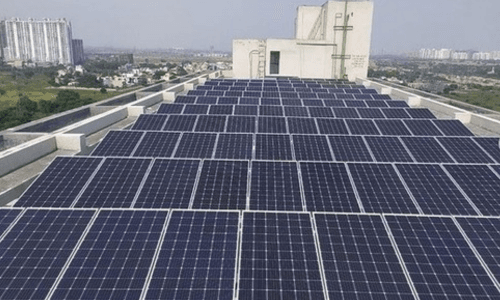Industrial Hybrid Solar Systems

Industrial operations are energy-intensive, and consistent power supply is crucial for productivity. Industrial hybrid solar systems offer a sustainable and cost-effective solution by combining solar energy, battery storage, and grid or diesel backup, ensuring uninterrupted operations even in remote or unreliable grid locations.
These systems are designed to provide industries with energy independence, reduced operational costs, and environmental sustainability, making them ideal for manufacturing plants, warehouses, IT facilities, and commercial complexes.
Keywords integrated naturally: Industrial hybrid solar systems, hybrid solar power for industries, industrial solar battery storage, solar diesel hybrid systems, grid-tied hybrid solar systems.
How Industrial Hybrid Solar Systems Work
An industrial hybrid solar system integrates multiple energy sources to provide reliable power:
Solar Panels (PV Modules): Convert sunlight into DC electricity with high efficiency and industrial durability, monitored in real-time for maximum output.
Battery Storage System: Stores excess solar energy using industrial-grade lithium-ion or lead-acid batteries for use during non-sunlight hours.
Inverters (Hybrid / Industrial-Grade): Convert DC to AC power and manage seamless switching between solar, battery, and grid/diesel backup.
Backup System (Grid or Diesel Generator): Provides continuous power during cloudy periods or grid outages, optimizing energy usage and minimizing downtime.
Monitoring & Control Systems: Real-time dashboards track generation, consumption, and storage, with alerts for proactive maintenance.

Benefits of Industrial Hybrid Solar Systems
Environmental Sustainability
- Reduces carbon footprint and supports CSR initiatives.
- Helps industries meet Renewable Purchase Obligations (RPOs).
Scalability & Flexibility
- Systems can be expanded to meet growing energy demands.
- Modular design allows easy integration of additional panels, batteries, or backup sources.
Energy Independence
- Ideal for industries in remote or off-grid locations.
- Minimizes risks of operational losses due to grid instability.
Uninterrupted Power Supply
Provides continuous electricity by switching automatically between solar, batteries, and backup sources.
Energy Cost Savings
Reduces reliance on grid or diesel, lowering electricity bills by 30–50%.
Key Components of Industrial Hybrid Solar Systems
Industrial Solar Panels (PV Modules)
- High-efficiency monocrystalline or polycrystalline modules designed for 25+ years of durability.
- Provide maximum solar energy generation for factories, warehouses, and IT facilities.
Hybrid Solar Inverters
- Convert DC to AC while managing power flow between solar, batteries, grid, and diesel backup.
- Essential for seamless operation of solar diesel hybrid systems in industries.
Industrial Solar Battery Storage
- Lithium-ion or advanced lead-acid batteries designed for high load and long cycles.
- Store surplus energy for nighttime or outage backup, ensuring uninterrupted operations.
Charge Controllers (MPPT Technology)
- Protects batteries from overcharging and ensures optimal charging efficiency.
- Extends battery life, especially under heavy industrial usage.
Diesel Generator / Grid Backup
- Acts as a secondary power source when solar and batteries are insufficient.
- Reduces reliance on the grid and ensures hybrid solar power for industries in remote or unreliable grid locations.
Monitoring & Control Systems
- Real-time dashboards and SCADA systems track solar generation, battery health, and diesel usage.
- Enable predictive maintenance and optimization of energy savings.
Mounting Structures & BOS (Balance of System)
- Corrosion-resistant mounting for rooftops or ground installations.
- Includes protection devices, cabling, and switchgear for safety and compliance.
Industrial Applications of Hybrid Solar Systems

Manufacturing Facilities
Powers machinery and production lines while ensuring uptime during grid outages.

Warehouses & Logistics Parks
Supports lighting, HVAC, and automated equipment with hybrid solar energy.

Data Centers & IT Facilities
Ensures 24/7 reliable power supply, reducing energy costs and improving sustainability.

Remote Industrial Parks & Commercial Complexes
Provides centralized hybrid solar solutions across multiple buildings.
Challenges of Industrial Hybrid Solar Systems
High Initial Investment
Industrial hybrid solar systems require significant upfront costs for panels, industrial solar battery storage, and hybrid inverters, though subsidies and loans reduce the financial burden.
Battery Replacement Costs
Batteries, a key part of hybrid solar power for industries, need replacement every 8–12 years, which adds to lifecycle costs.
Space Requirement
A 1 MW grid-tied hybrid solar system requires 4–5 acres or large rooftop space, along with secure rooms for batteries and diesel backup systems.
Complex Integration
Combining solar, batteries, and diesel generators requires precise engineering to balance loads, prevent downtime, and optimize efficiency.
Maintenance & Monitoring
Industrial hybrid solar systems need advanced monitoring for real-time performance tracking and regular maintenance of inverters, batteries, and backup sources.
Subsidies for Industrial Hybrid Solar Systems in India
- Industries investing in hybrid solar systems can benefit from a mix of central and state-level subsidies, designed to reduce upfront costs and improve ROI.
- Accelerated Depreciation (AD) – Income Tax Act, Section 32
Allows industries to depreciate up to 40% of project cost in the first year, reducing taxable income and improving payback. - Central Financial Assistance (CFA) – MNRE
Provides up to 30% subsidy on benchmark costs for eligible rooftop and ground-mounted solar projects. - Production Linked Incentive (PLI) Scheme for High-Efficiency Solar PV Modules
Offers financial incentives for using domestically manufactured solar modules, lowering system costs and boosting local manufacturing.
Why Choose Us for Industrial Hybrid Solar Solutions
Sustainability Commitment
Helping industries achieve long-term energy independence and reduce carbon footprint.
Proven Expertise
Proven experience in designing and implementing large-scale hybrid solar systems.
Premium Technology
Tier-1 solar panels, industrial-grade inverters, and advanced battery storage.
Custom Engineering
Tailored solutions based on facility load profiles and operational needs.
End-to-End Support
From site survey and design to installation, monitoring, and maintenance.
Frequently Asked Questions
What is the typical lifespan of an industrial hybrid solar system?
Solar panels last 25–30 years; batteries typically 8–12 years; inverters 10–12 years.
Can my industry operate during grid outages?
Yes, hybrid systems switch to battery or diesel backup automatically for uninterrupted operations.
How much area is required for a 1 MW hybrid solar plant?
Around 4–5 acres for ground-mounted systems or 100,000 sq. ft. for rooftop installations, plus battery room space.
What is the ROI for industrial hybrid solar systems?
Typically 3–6 years depending on energy consumption, diesel savings, and financial incentives.
Are loans or subsidies available for hybrid solar systems?
Yes, loans covering 70–90% of the cost, Accelerated Depreciation (AD), CFA, and state-specific subsidies are applicable.
